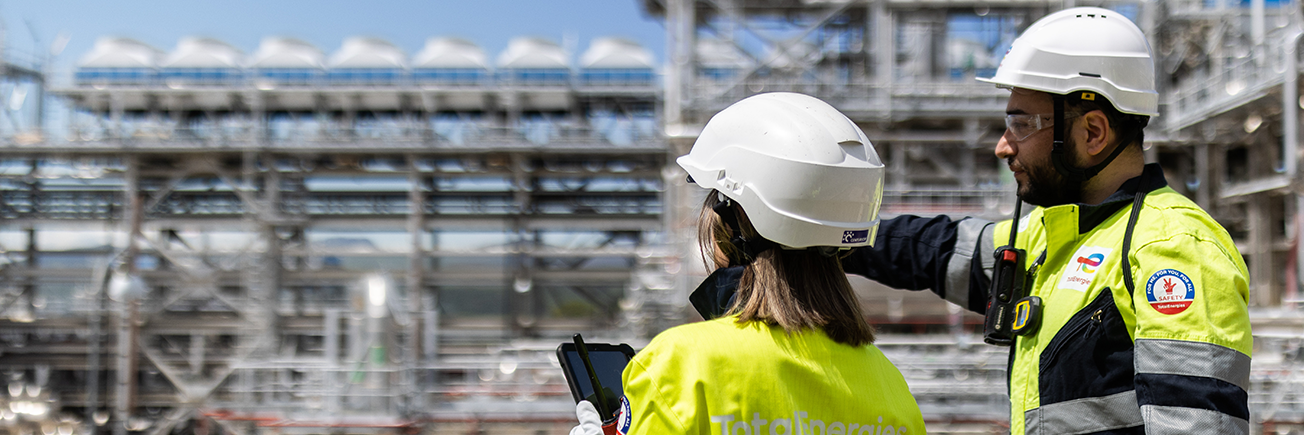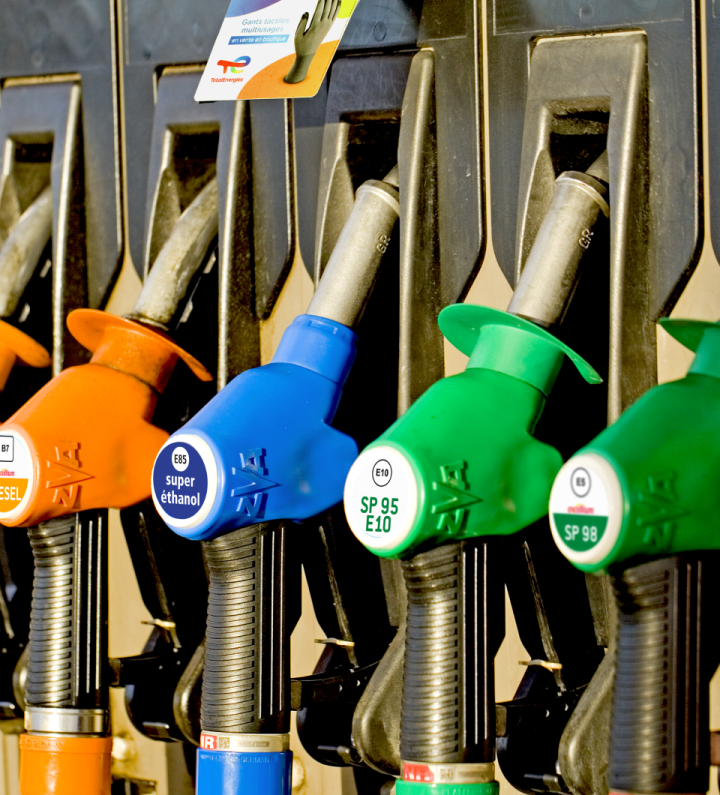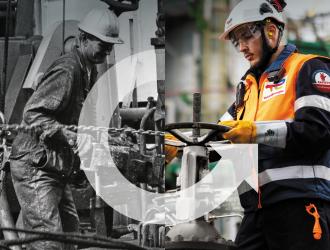Health and Safety for Everyone

Health and Safety for Everyone
Health and Safety for Everyone
Safety is more than just a priority at TotalEnergies; it is a core value on which we will not compromise. Producing, transforming and distributing energy inherently involves certain risks for the health and safety of employees, contractors and residents in the vicinity of our industrial sites. Furthermore, certain products marketed by TotalEnergies may present risks for the health and safety of consumers. It is around safety, in accordance with the strictest standards and with regard to health that the operational measures and indicators used to manage TotalEnergies’ activities are based.
Our safety targets are clear – we have set a goal of zero fatalities and are aiming for ongoing reductions in the number of accidents, safeguarding the health of our employees at work and avoiding major industrial accidents. We also seek to minimize the risks of consuming our products.

As part of the Strategy & Sustainability Department, our Health, Safety and Environment (HSE) division coordinates the promotion and implementation of TotalEnergies’ health and safety policies.
We monitor a range of indicators to constantly adapt our actions to better protect personal health and safety. Our operations are guided by the Safety Health Environment Quality Charter and the HSE reference framework known as One MAESTRO, which sets out the HSE principles to be applied throughout the Company. Our subsidiaries operating sites are audited every three to five years to evaluate the implementation of this framework.
Furthermore, our subsidiaries holding an interest in assets operated by third parties seek to promote the Company’s HSE requirements and best practices. They must also use their best efforts to enable that similar requirements are adopted by the operator. The HSE risks of these assets must be assessed at least every five years.
In addition, before any final decision to invest in a construction project or acquire or sell a subsidiary, the proposals presented to the Company’s Risk Committee are assessed with regard to health and safety risks.
In order to prevent any major industrial accidents at our facilities, our risk management policy applies from design phase and continues throughout the facilities’ lifespan.
The technical standards we apply when designing and building facilities integrate the applicable regulatory requirements and refer to industry best practices. To manage operations and uphold the integrity of facilities we operate, formal rules have been set out to prevent specific risks that have been identified either by means of risk analyses or from internal and industry feedback.
To deal effectively with the consequences of a major industrial accident, we have implemented a global crisis management system, which includes an on-call system available 24/7, a specific process for subsidiaries and a special crisis management platform. The standards clearly stipulate that subsidiaries must have response plans and procedures in place and test them regularly in the event of accidents such as leaks, fires, explosions or transport accidents.
Our workplace accident prevention policy concerns not only our employees, but also the employees of contractors working on sites operated by the Company.
In addition to the One MAESTRO reference framework, we have established two global programs:
- The 12 Golden Rules for safety at work: Easy to understand, easy to remember and built on lessons learned from accidents in the workplace, these rules are essential to achieving our safety ambitions.
- The “Our lives first” program: This program includes joint safety tours with contractors, the “Safety Green Light” (a pre-work routine on all operated sites concerned) and the “Life Saving Checks” tool to intensify checks in the field and measure compliance with safety rules for the five high-risk activities (work at height, lifting operations, work on energy-powered systems, work in confined spaces and hot work).
The correct implementation of the One MAESTRO reference framework, and more generally, of all the Company’s occupational safety programs, is verified with site visits and audits. Moreover, verification of the HSE commitment of contractors involves a rigorous qualification process. In order to encourage everyone to get on board with our HSE policy, we provide training to establish a broad-based, consistent body of knowledge that is shared by everyone.
* TRIR (Total Recordable Injury Rate): number of workplace accidents per million hours worked.
In the field of road transportation, we adopted a policy many years ago to reduce the number of accidents by applying standards, providing driver training, promoting communication, defining technical specifications for Company vehicles and rolling out a large-scale inspection program of transportation contractors. It applies to all our employees, as well as the employees of contractors.
With respect to maritime and inland waterways transportation, the process and criteria for selecting ships and barges are defined by the teams in charge of vetting. These criteria take into account not only the ship or barge but also the crew, ensuring that the crew has the qualifications and training required and that the safety management system is effectively applied.
In air transportation, we have put in place a carrier selection process to limit the risks relating to travel by Company and contractors’ employees, if their journey is organized by TotalEnergies. This process is based on data from recognized international organizations and civil aviation authorities’ recommendations.
The One MAESTRO framework provides that our subsidiaries identify and evaluate risks at the workplace in the short, medium and long term and put in place suitable action plans. In addition, TotalEnergies has developed a health reference framework to protect employees’ physical and mental health by implementing an appropriate risk analysis and prevention policy.
As such, the health guidelines require every subsidiary to offer its employees a medical checkup at least every two years and set out a formal medical monitoring procedure, taking into account the requirements under local law and the level of exposure of its personnel to the various risks. On a broader level, we support the promotion of individual and collective health programs in our operating countries through vaccination campaigns and screening programs, which are available for employees, their families and local communities.
In addition, we have put in place a policy to prevent psychosocial risks and have developed a global program for all employees exposed to such risks. We ensure that our managerial staff members are aware of these risks and the impact the workplace can have on the wellbeing of their employees.
Unless certain precautions are taken, some products marketed by TotalEnergies may pose potential consumer health and safety risks. Respecting regulatory requirements is the main measure to limit risk throughout the life cycle of these products.
In order to reduce potential risks to consumer health and the environment, we have defined the minimum requirements for our petroleum or chemical products worldwide. They include identifying and assessing the risks inherent to these products and their use, as well as providing information to consumers. The implementation of these requirements is monitored by in-house teams of regulatory experts, toxicologists and ecotoxicologists.
Our transition in action: Health and safety for everyone
Every year in April, the International Labour Organization celebrates the World Day for Safety and Health at Work. This event gives TotalEnergies an opportunity to remind people of the importance of safety. A different theme is chosen every year so we can discuss ideas with our employees and partner companies and work together to achieve our health and safety targets.
Chapter 5.3.1.2 – “Health and safety”
Further more
More Energy, Less Emissions


















